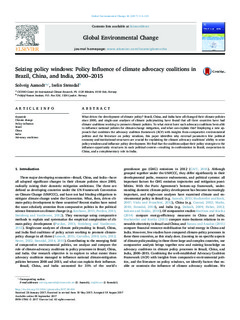| dc.contributor.author | Aamodt, Solveig | |
| dc.contributor.author | Stensdal, Iselin Phoebe | |
| dc.date.accessioned | 2018-10-11T14:35:36Z | |
| dc.date.available | 2018-10-11T14:35:36Z | |
| dc.date.created | 2017-09-26T10:08:18Z | |
| dc.date.issued | 2017 | |
| dc.identifier.citation | Global Environmental Change. 2017, 46 114-125. | |
| dc.identifier.issn | 0959-3780 | |
| dc.identifier.uri | http://hdl.handle.net/11250/2567704 | |
| dc.description.abstract | What drives the development of climate policy? Brazil, China, and India have all changed their climate policies since 2000, and single-case analyses of climate policymaking have found that all three countries have had climate coalitions working to promote climate policies. To what extent have such advocacy coalitions been able to influence national policies for climate-change mitigation, and what can explain this? Employing a new approach that combines the advocacy coalition framework (ACF) with insights from comparative environmental politics and the literature on policy windows, this paper identifies why external parameters like political economy and institutional structures are crucial for explaining the climate advocacy coalitions’ ability to seize policy windows and influence policy development. We find that the coalitions adjust their policy strategies to the influence-opportunity structures in each political context—resulting in confrontation in Brazil, cooperation in China, and a complementary role in India | |
| dc.description.abstract | Seizing policy windows: Policy Influence of climate advocacy coalitions in Brazil, China, and India, 2000?2015 | |
| dc.language.iso | eng | |
| dc.title | Seizing policy windows: Policy Influence of climate advocacy coalitions in Brazil, China, and India, 2000?2015 | |
| dc.title.alternative | Seizing policy windows: Policy Influence of climate advocacy coalitions in Brazil, China, and India, 2000?2015 | |
| dc.type | Peer reviewed | |
| dc.type | Journal article | |
| dc.description.version | publishedVersion | |
| dc.source.pagenumber | 114-125 | |
| dc.source.volume | 46 | |
| dc.source.journal | Global Environmental Change | |
| dc.identifier.doi | 10.1016/j.gloenvcha.2017.08.006 | |
| dc.identifier.cristin | 1498110 | |
| dc.relation.project | Norges forskningsråd: 209701 | |
| cristin.unitcode | 7430,0,0,0 | |
| cristin.unitname | Fridtjof Nansens institutt | |
| cristin.ispublished | true | |
| cristin.fulltext | original | |
| cristin.qualitycode | 2 | |
